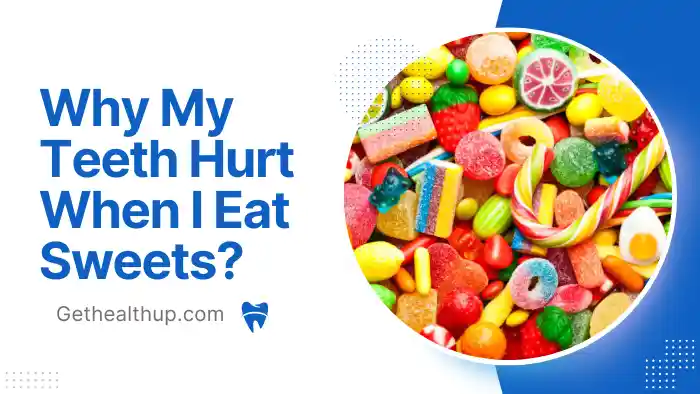Many people experience tooth sensitivity when they eat sweets. This can be a frustrating and painful experience, especially for those with a sweet tooth.
Tooth hurts when eating sweets can be caused by various factors, including tooth decay, gum disease, and worn enamel.
What Causes Tooth Sensitivity?
There are many reasons why teeth can become sensitive to sweet foods. One of the most common causes is enamel (dentin) loss.
When the enamel on teeth is worn down or eroded, the sensitive dentin layer underneath is exposed.
This can be brought about by various elements, including:
- Brushing excessively hard or utilizing a hard-seethed toothbrush
- Consuming acidic foods and drinks
- Gum recession
- Grinding teeth at night
Causes
There are several reasons why teeth may hurt when eating sweets. The following sub-sections explain the most common causes.
Tooth Decay
Tooth decay, or cavities, is the most common cause of tooth pain when eating sweets.
When sugary foods are consumed, the bacteria in the mouth convert the sugars into acid.
This acid can eat away at the enamel on the teeth, causing a cavity. When a cavity is small, there may be no noticeable symptoms.
However, as the cavity grows, it can cause sensitivity and pain, especially when eating sweets.
Enamel Erosion
Enamel erosion is another cause of tooth pain when eating sweets. Enamel is the hard, protective layer on the outside of the teeth.
The underlying layer, called dentin, can become exposed when it wears away. Dentin contains tiny tubes that lead to the nerve centre of the tooth.
When sugar comes into contact with these tubes, it can cause pain and sensitivity.
Enamel erosion can be caused by various factors, including acidic foods and drinks, brushing too hard, and grinding teeth.
Sensitive Teeth
Sensitive teeth can also cause pain when eating sweets.
People with sensitive teeth may experience discomfort or pain when consuming hot or cold foods and drinks and sweet or acidic foods.
This sensitivity is often caused by exposed dentin, as mentioned above.
Other causes of sensitive teeth include gum disease, tooth decay, and worn fillings.
Sometimes, sensitivity may be a side effect of specific dental procedures, such as teeth whitening.
In conclusion, tooth pain when eating sweets can be caused by tooth decay, enamel erosion, and sensitive teeth.
See a dentist if you experience persistent pain or sensitivity, as it may indicate a more severe problem.
Symptoms
People who experience pain or discomfort in their teeth after eating sweets may have several symptoms.
These symptoms can include pain or discomfort, sensitivity to hot or cold, and visible damage.
Pain or Discomfort
One of the most common symptoms of sensitive teeth is pain or discomfort when eating sweets.
People may feel a sharp, stabbing pain or a dull, throbbing ache in their teeth after eating sugary foods.
This pain can be temporary or long-lasting, depending on the severity of the condition.
Sensitivity to Hot or Cold
Another symptom of sensitive teeth is sensitivity to hot or cold temperatures.
People may experience a sudden, sharp pain in their teeth when they eat or drink something hot or cold.
Various factors, including tooth decay, gum disease, or enamel erosion, can cause this sensitivity.
Visible Damage
In some cases, people may experience visible teeth damage from eating sweets. This damage can include cavities, cracks, or chips in the teeth.
People may also notice that their teeth appear discoloured or stained after eating sugary foods.
People who experience pain or discomfort in their teeth after eating sweets should consult a dentist for an evaluation.
Can sensitive teeth be sensitive to sugar?
Sensitive teeth are common and can cause discomfort when eating hot, cold, sweet, or acidic foods. The discomfort is typically a short, sharp pain when an exposed dentin surface of your tooth comes in contact with certain foods or liquids. So, can sensitive teeth also be susceptible to sugar specifically?
The answer is yes – sensitive teeth can react to sugary foods and cause pain. Sugar is an acidic food, and acidic foods are common triggers for sharp teeth pain. When you eat or drink sugary foods, the sugar interacts with plaque bacteria on your teeth to create acids.
These acids can remove enamel and expose the underlying dentin. The dentin has tiny tubules connected to nerves under the tooth, so when the dentin is exposed, sensations like hot, cold, and sugar can stimulate the nerves and cause pain.
Some tips to help manage sugar sensitivity with sensitive teeth include:
- Using a sensitivity toothpaste.
- Avoiding acidic and sugary foods and drinks.
- Waiting 30 minutes after acidic foods before brushing your teeth.
- Drinking with a straw.
- Visiting your dentist to address any underlying issues.
While sensitive teeth may always have some reaction to sugar, there are ways to reduce discomfort. Be kind to your sharp teeth by monitoring sugary intake and following your dentist’s suggestions for managing sensitivity triggers. With the proper preventive habits, you can still enjoy the sweet things in life, even with sensitive teeth!
How do I fix tooth sensitivity?
We all experience self-doubt from time to time. Those nagging negative thoughts and fears that we aren’t good enough can affect our self-esteem and prevent us from reaching our full potential. While self-doubt is a natural human emotion, it doesn’t have to control your life. Here are some inspirational quotes on overcoming self-doubt:
“Our doubts are traitors, and make us lose the good we oft might win, by fearing to attempt.” – William Shakespeare
This quote from Shakespeare highlights how self-doubt can hold us back from trying to accomplish great things. If your doubts are getting in the way of going after what you want, remember that taking risks and putting yourself out there is necessary for growth.
“Man often becomes what he believes himself to be. If I keep saying to myself that I cannot do a certain thing, I may become incapable of doing it. On the contrary, if I believe I can do it, I shall surely acquire the capacity to do it even if I may not have it initially.” – Mahatma Gandhi.
Gandhi emphasizes the power of self-belief and positive thinking. Maintaining confidence in yourself can increase your abilities over time. Do not allow self-doubt to diminish your self-confidence. Instead, focus on a growth mindset and affirm your capabilities.
Though self-doubt is normal, it can limit us. Turn to inspirational quotes when you are feeling self-doubt creep in. Let them motivate you to believe in yourself and continue boldly.
Prevention and Treatment
There are various ways to prevent and treat tooth sensitivity caused by eating sweets.
Here are a few of the greatest effective methods:
Oral Hygiene Practices
Good oral hygiene practices can help prevent tooth sensitivity.
It is also important to avoid brushing too hard, as this can cause gum recession and expose the sensitive root surfaces of the teeth.
Desensitizing Toothpaste
Desensitizing toothpaste can help relieve tooth sensitivity.
These toothpaste contain ingredients such as potassium nitrate or strontium chloride, which help block the transmission of pain signals from the tooth surface to the nerves.
It is essential to use desensitizing toothpaste regularly for several weeks to see results.
Fluoride Treatment
Fluoride treatment can help strengthen tooth enamel and reduce tooth sensitivity.
This treatment involves applying a fluoride gel or varnish to the teeth, which helps remineralize the enamel and make it more resistant to acid erosion.
A dentist or dental hygienist usually performs fluoride treatment, which may need to be repeated every few months.
In addition to these methods, avoiding consuming too many sugary or acidic foods and drinks is essential, as these can erode tooth enamel and increase the risk of tooth decay and sensitivity.
It is also essential to visit a dentist regularly for check-ups and cleanings, as early detection and treatment of dental problems can help prevent tooth sensitivity and other oral health issues.
Frequently Asked Questions
What is tooth sensitivity?
Tooth sensitivity refers to teeth discomfort or pain when exposed to certain stimuli, such as cold or hot temperatures, acidic foods, or sweets.
Why do my teeth hurt when I eat sweets?
Sweets contain sugar, which can sticky film called plaque to teeth and gums or receding gums combine with bacteria in the mouth to produce acid. This acid can weaken and erode the protective enamel layer of teeth, leading to sensitivity and pain.
What are some other causes of tooth sensitivity?
Other causes of tooth sensitivity can include brushing too hard, using a hard-bristled toothbrush, gum disease, tooth decay, cracked or chipped teeth, and grinding or clenching teeth.
How can I prevent tooth sensitivity?
To prevent tooth sensitivity, practising good oral hygiene is essential, including brushing twice a day with a soft-bristled toothbrush, flossing daily, and using fluoride toothpaste. Avoiding acidic foods and drinks, reducing sugar intake, and using a mouth guard at night to prevent grinding can also help.
What can I do to reduce tooth sensitivity?
To reduce tooth sensitivity, you can try using a desensitizing toothpaste, which contains ingredients that block pain signals to the nerves in your teeth. Using a fluoride rinse or undergoing a fluoride treatment at the dentist’s office can also help strengthen tooth enamel and reduce sensitivity.
Can tooth sensitivity be a sign of a more serious problem?
Yes, tooth sensitivity can sometimes be a sign of a more severe problem, such as gum disease, a cracked tooth, or a cavity. If you’re experiencing persistent sensitivity, seeing a dentist to rule out any underlying issues is essential.
Is tooth sensitivity common?
Tooth sensitivity is a common problem, with an estimated 1 in 8 adults experiencing some sensitivity.
Can tooth sensitivity go away on its own?
Tooth sensitivity can sometimes go away on its own, mainly caused by temporary factors like over-brushing or a recent dental procedure. However, seeing a dentist is essential if the sensitivity persists or worsens.
Can I still eat sweets if I have tooth sensitivity?
While limiting your sugar intake to protect your teeth is essential, you don’t necessarily have to avoid sweets altogether if you have tooth sensitivity. You may be able to enjoy them in moderation by eating them with meals, brushing your teeth afterwards, or choosing sugar-free options.
Is there a cure for tooth sensitivity?
There’s no one-size-fits-all cure for tooth sensitivity, as the treatment will depend on the underlying cause. However, many options are available to manage and reduce sensitivity, including desensitizing toothpaste, fluoride treatments, and dental procedures like fillings or root canals.

A Blogger, Author and Researcher! Gohar Aalam is recognized as a full-time blogger for Health and Tech Niches. I’m a Fountainhead of Gethealthup.com, will provides high quality knowledge.








